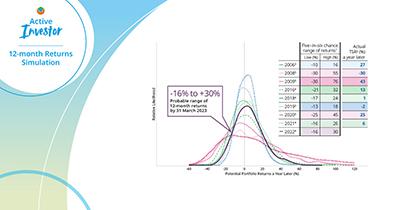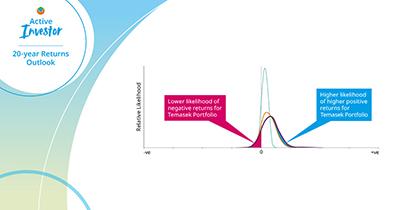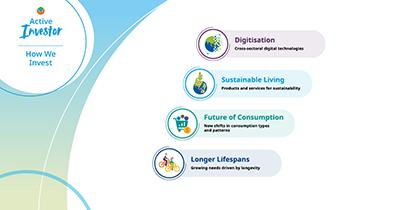How We Manage Risks
There are inherent risks whenever we invest, divest, or hold our assets, and wherever we operate.
Jump to
We adopt a long term view of our investments, with the flexibility to take concentrated positions. We invest across all stages of the business life cycle, from early stage and/or unlisted, to large or listed assets. We do not have targets for investing by asset class, country, sector or single name.
Our long investment horizon means we have a portfolio of predominantly equities, including listed and unlisted assets, and private equity funds, designed to deliver higher risk-adjusted returns over the long term.
Consequently, our portfolio is expected to have higher year-to-year volatility of annual returns, with higher risks of negative returns in any one year.
We adopt a long term view of our investments, with the flexibility to take concentrated positions.
Our investment posture is to ride out short term market volatility and focus on generating sustainable returns over the long term.
Given the expected volatility, we manage our leverage and liquidity prudently for resilience and investment flexibility, even in times of extreme stress.
Our investment posture is coupled with a culture of risk awareness and balanced risk taking. This applies to both our investment activities and institutional capabilities. Our risk sharing compensation philosophy puts the institution above the individual, emphasises long term over short term, and aligns the interests of our staff with those of our shareholder.
We have no tolerance for risks that could damage the reputation and credibility of Temasek.
We have no tolerance for risks that could damage the reputation and credibility of Temasek.
Organisational Risk Management Framework
Our Organisational Risk Management Framework includes Risk Return Appetite Statements (RRAS) which set out various levels of risks tolerance, from reputational risk, to liquidity risk and sustained loss of overall portfolio value over prolonged periods.
| RRAS 1 | We have no tolerance for risks that could damage Temasek’s reputation and credibility |
|---|---|
| RRAS 2 | We focus on performance over the long term |
| RRAS 3 | We have flexibility to take concentrated positions |
| RRAS 4 | We maintain a resilient balance sheet |
| RRAS 5 | We evaluate the potential for sustained loss of overall portfolio value over prolonged periods, and use different scenarios to test our resilience |
To minimise operational risks, we embed risk management in our systems and processes. These include our approval authority delegation, company policies, standard operating procedures and risk reporting to our Board.
Formalised processes instil the discipline to consider various perspectives, including ESG risks.
Formalised processes instil the discipline to consider various perspectives, including Environmental, Social and Governance (ESG) risks. These include climate risks, both transition and physical, as an integral part of these processes. For example, we apply an internal carbon price, currently US$50 per tonne of carbon dioxide equivalent (tCO2e) in our investment evaluations to account for the potential exposure of an investment to transition risk.
Formalised processes instil the discipline to consider various perspectives, including ESG risks.
Investment proposals to our investment committee are submitted under a two-key system, for instance by both market and sector teams. Depending on the size or risk significance, these proposals may be escalated to our Executive Committee or Board for final decision. Functional teams provide additional specialist perspectives and independent reviews. Country and sector risks are factored into our risk-adjusted cost of capital for each investment. Our valuation discipline is based on our view on intrinsic value over varying investment horizons.
We track and manage risks proactively, through economic and market cycles, including specific risks at the asset level.
We assess the sustained impact of various risk scenarios on the intrinsic value of our investments. The aggregate of these changes provides an estimate of the portfolio level variation in present value and future cash flows and income in each scenario.
We track and manage risks proactively, through economic and market cycles, including specific risks at the asset level.
As illustrated in the diagram below, Fundamental Earnings Impact is our estimate of sustained loss. This is different from Trough Impact, which includes mark to market effects due to short term increases in risk aversion. We do not manage our portfolio to short term mark to market changes.
Illustration of Fundamental Earnings Impact
Based on our assessments of any likely sustained loss, consistent with our intrinsic value discipline, we may manage the risks as follows:
- Divest, hold or protect the individual investment impacted;
- Change the portfolio composition for the long run;
- Take actions to protect the portfolio.
In addition to scenario-based stress tests, we also monitor general market risk indicators such as the CBOE Volatility Index (VIX).
VIX Trend (March 2005 to March 2022)
Legal & Regulatory
We comply with all obligations under Singapore laws and regulations, including those arising from international treaties and UN sanctions. We also comply with the laws and regulations of jurisdictions where we have investments or operations.
Our global footprint, coupled with an ever-evolving legal and regulatory environment and increasing oversight by authorities, underscores the importance of robust compliance programmes. We continue to build expertise across novel and developing areas that we are involved in to ensure what we are able to be a trusted adviser and manage legal risks appropriately.
We comply with the laws and regulations of jurisdictions where we have investments or operations.
Our Legal & Regulatory (L&R) department ensures that policies, processes and systems are appropriately designed, consistent with applicable laws, and aligned with Board directives. For instance, our policy on derivative transactions permits only personnel authorised by a board resolution to enter into such transactions within tightly-defined scopes and limits on behalf of specific designated entities. We continuously monitor regulatory developments to ensure that our policies, procedures and monitoring systems reflect these changes.
L&R monitors regulatory reporting compliance through securities tracking systems. Regulatory requirements and monitoring systems are continually reviewed and updated to reflect changes in laws and regulations, governance principles, and market practices.
We encourage and facilitate the development of a sound corporate culture that incentivises good staff behaviour. High ethical standards and compliance with applicable laws and regulations are expected in the pursuit of our business interests. Specific attention is directed at governance, incentive systems and training.
Our policy permits only personnel authorised by a board resolution to enter into derivatives transactions within tightly-defined scopes and limits.
At the core of this is our Temasek Code of Ethics and Conduct (T-Code) and its related policies that guide our Board directors and staff in their daily dealings and conduct. With integrity as the key overarching principle, T-Code policies cover areas such as anti-bribery, whistle-blowing, management of confidential information, and prohibition against insider trading. Our annual staff bonus plans include T-Code compliance requirements.
Business Continuity and Incident Management
We are committed to continuously improve the way we manage business continuity risks.
Our contingency management framework ensures business continuity and manages incidents arising from safety, physical security, cybersecurity, and other threats. The framework takes into account the potential impact of emerging risks and new responses enabled by technological advancements. We monitor security, safety, and health situations around the world on a regular basis.
The care and well-being of our staff and their families during any emergency is of paramount importance. We are ready to provide necessary assistance to our staff wherever they are based and support members of our wider ecosystem who may be in disaster areas. For example, when the Russia-Ukraine conflict broke out, we provided our staff from Ukraine security and medical advice to share with their family and friends back home.
We recognise the importance of building psychological resilience among our staff. About 40 staff in Singapore were trained to be Crisis Supporters to provide psychological support to their colleagues during major events such as the ongoing pandemic. They attended a workshop that equipped them with a broad understanding of mental health and psychological first aid. We will train more staff across all our offices to be Crisis Supporters.
We conducted response exercises regularly over the year to ensure that our contingency plans remain effective, relevant, and adequate, including responses to failure of critical infrastructure and cyber-related risks. To manage cyber risks, we regularly review our cybersecurity plan to ensure that it meets industry standards and continuously enhances our cybersecurity defence and resilience. We also appointed a Chief Information Security Officer to oversee the cyber strategy for the firm, and work with Temasek portfolio companies and partners to champion best practices in the cybersecurity space.
Since the start of the pandemic, our Business Continuity and Technology teams have been supporting our staff around the world to adapt to long periods of working from home. We have ensured that most of our critical business functions can be carried out effectively from home. We constantly work on improving our recovery strategies and capabilities to ensure that critical business functions can resume functioning in a timely manner during times of emergencies.
Efforts were made to ensure staff remain effective when working from home and to care for their physical and psychological well-being. Care packages which included essential supplies such as masks and wellness equipment were provided to all our staff around the world. We communicated regularly with our staff on developments in the COVID-19 situation, particularly with specific guidance on the impact of the pandemic in the locations in which they are based.
We continue to work with our portfolio companies and various government agencies to support the responses to the COVID-19 outbreak, and to protect and safeguard our people and affected communities. Our staff have also stepped forward to volunteer in large numbers to support wider COVID-19 initiatives led by the firm.


